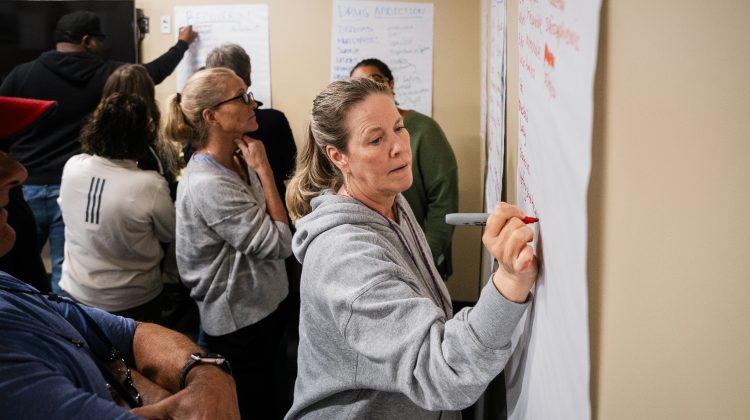SWAMPSCOTT — Collaborating with the Marblehead and Salem Health Departments, the Town is running a Recovery Coach Academy, which is free for community members, to help people who may struggle with addiction. It is spearheaded by Program Facilitators Michelle Simons and Tito Rodriguez.
The Academy was funded by the opioid abatement settlement money through the three health departments, and it took place at the Swampscott Police Station. Sessions for the academy are slated for Oct. 7-8 and Oct. 14-15 from 9 a.m.-3 p.m.
“The Academy is about giving people the competency to work with someone who’s in recovery, to walk their path alongside them,” Rodriguez said. “It’s not the role of a traditional counselor… It’s about removing the barriers, obstacles, and stigma that people are facing early in recovery.”
Simons, who also serves as the Opioid Settlement Funds Program contractor, said one of the goals is to “create champions within the community.”
“A lot of times, there’s confusion about what a recovery coach actually is. I hear, ‘Is it a therapist or a sponsor?’ Or ‘Is it a case manager?’… There are distinguishing characteristics of a recovery coach that separates them from all these other roles,” Simons said.
She noted that the work of counselors tends to focus on the past, while a recovery coach “is really focused on the present” in order to ask, “How can I support you in your journey today?”
“Also, a lot of the time, counselors are more ‘disease focused.’ They focus on the substance and all of that,” Rodriguez added. “With the academy, it’s based on more of a recovery focus rather than substances.”
Simons noted that discussions with the class cover a wide spectrum of topics and ideas, which range from talking about the stigma that follows negative labels often attached to addiction to various group discussions and exercises, with an emphasis on connection.
She continued, explaining that one of the lessons covers three core pillars, or aspects, of being a recovery coach: “listening actively,” “discovering and managing your own stuff,” and “asking good questions.”
“We tell people ahead of time that we’re going to be discussing some issues that we all have personal experiences with, so sometimes, emotions get heightened,” she said. “Sometimes, someone’s experience is going to be different than another’s… We talk about being aware of our emotions getting heightened and how we can manage that and still be able to support somebody.”
Other elements include helping participants develop resources in order to help better serve others and crisis intervention, Simons said.
Rodriguez said that the four-day training aims to assure people it’s “OK to disagree” and “chip away at the constant themes around biases.”
“The other theme we really try to hammer home is the theme of connection. The importance of connection with the individual and how key that is — which is very different from those other roles because a counselor’s connection with someone might be 45 minutes at a time… But the connection with a recovery coach is 24-hours a day,” he said.
Simons expressed her gratitude for the collaboration with Swampscott Police.
“It’s been fantastic. Especially Police Sgt. Brendan Reen, who’s been instrumental. He gave us this space and free range here. They’ve been super welcoming,” she said. She also thanked the Marblehead and Salem Health Departments for their help bringing the initiative to life.
Participant Cindy Madrid said that one of the most impactful elements of participating in the program is the ability to help others.
“It’s about giving back to somebody that helped me one time, and I want to give that back. (I want) to be part of that solution,” Madrid said.
Another participant, Stephanie Calnan, echoed that sentiment.
“It’s about one peer helping another. I’m in recovery, and I feel like it’s my calling to help others,” Calnan said. “You can be a millionaire, a doctor, a lawyer, and still suffer from addiction.”
Roosevelt Hanson said that “going into it with the idea that you’re helping another person, that person is also helping you.”
“Use your strength, and use what you’ve learned. Use your life experiences to help them help themselves. That’s the most important part of it for me,” Hanson said.
For Shauna Laliberte, she likes being what she once needed for other people now.
“That’s my goal. Just to be there, and be what I needed… That’s what it really is, it’s filling a void that, otherwise, remains empty,” she said.
Kayla Figelski said, “When you’re in recovery, a lot of times you’re sitting across from someone who cannot empathize with you… Some of us have been incarcerated, or went through multiple rehab detoxes, and there has always been someone across from us that doesn’t really understand. But a recovery coach understands.”
Figelski continued, noting that she wants to turn her experiences into a “message for someone else” to give people hope to get through obstacles they might face.
Another participant, Sigrun Hancock, spoke on losing her son to an overdose and the way stigma can impede the process of someone seeking help.
“It bothers me that a lot of people say it starts with parenting because I feel like I’m a good mother… That stigma is something that I really want to fight against,” she said.
Salvatore DiMino said that “the opposite of addiction is connection.”
“That’s what our role is, to be that connector to the person, whether it be emotional, spiritual, or psychological… We’re there to be advocates,” he said.



